Shareholder Rights and Director Duties in NZ Companies Act 1993
VerifiedAdded on 2020/05/16
|5
|1180
|48
AI Summary
The assignment examines the legal frameworks governing shareholder rights and director responsibilities under New Zealand's Companies Act 1993. It highlights key sections such as 106(1) for special resolutions, section-177 for ratification, and sections related to duty of care (130, 131, 134). The case study involves FCWNZL, where shareholders discover undisclosed major transactions and the implications of delegation in decision-making processes. It underscores the necessity for directors to act with care, skill, and diligence, ensuring transparency and shareholder involvement in significant company decisions.
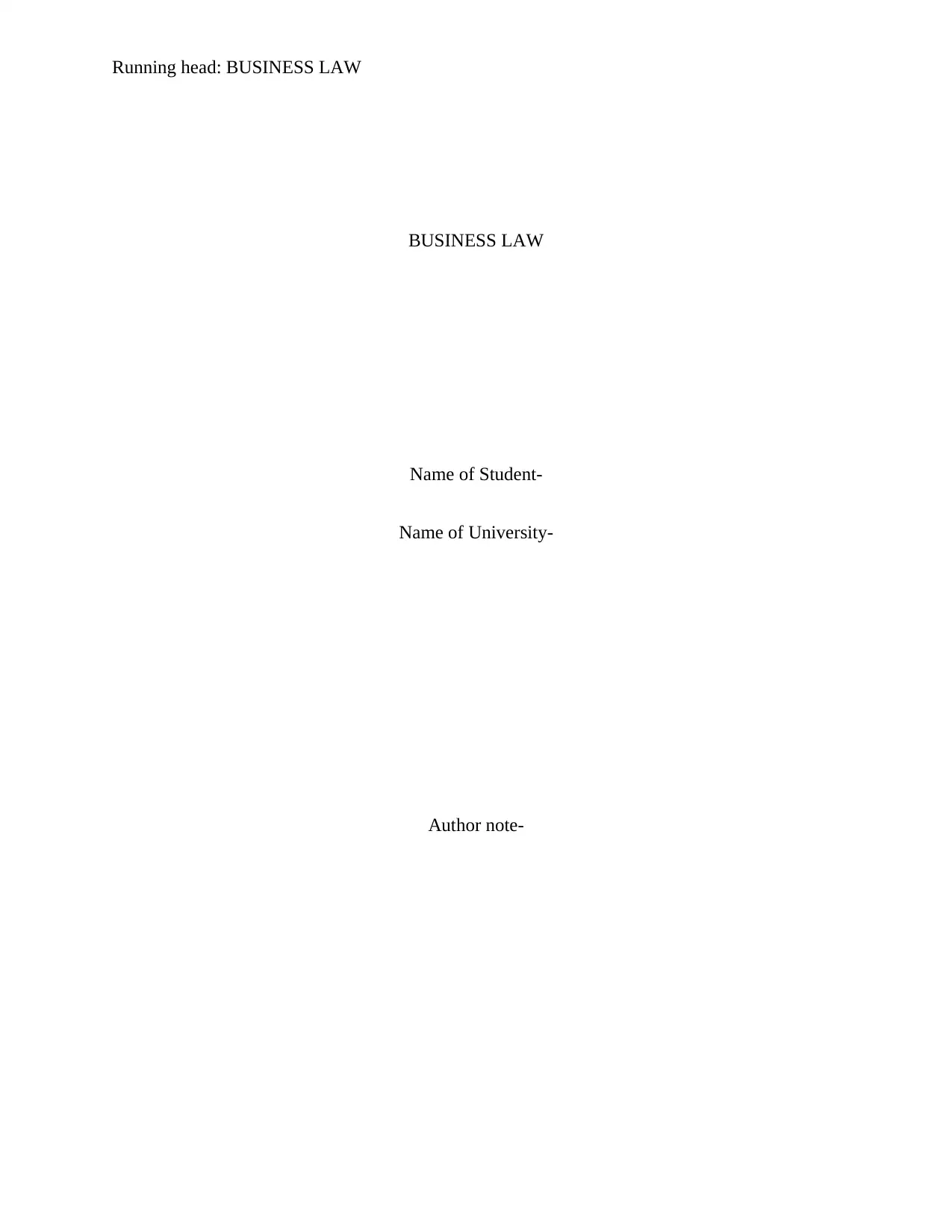
Running head: BUSINESS LAW
BUSINESS LAW
Name of Student-
Name of University-
Author note-
BUSINESS LAW
Name of Student-
Name of University-
Author note-
Paraphrase This Document
Need a fresh take? Get an instant paraphrase of this document with our AI Paraphraser
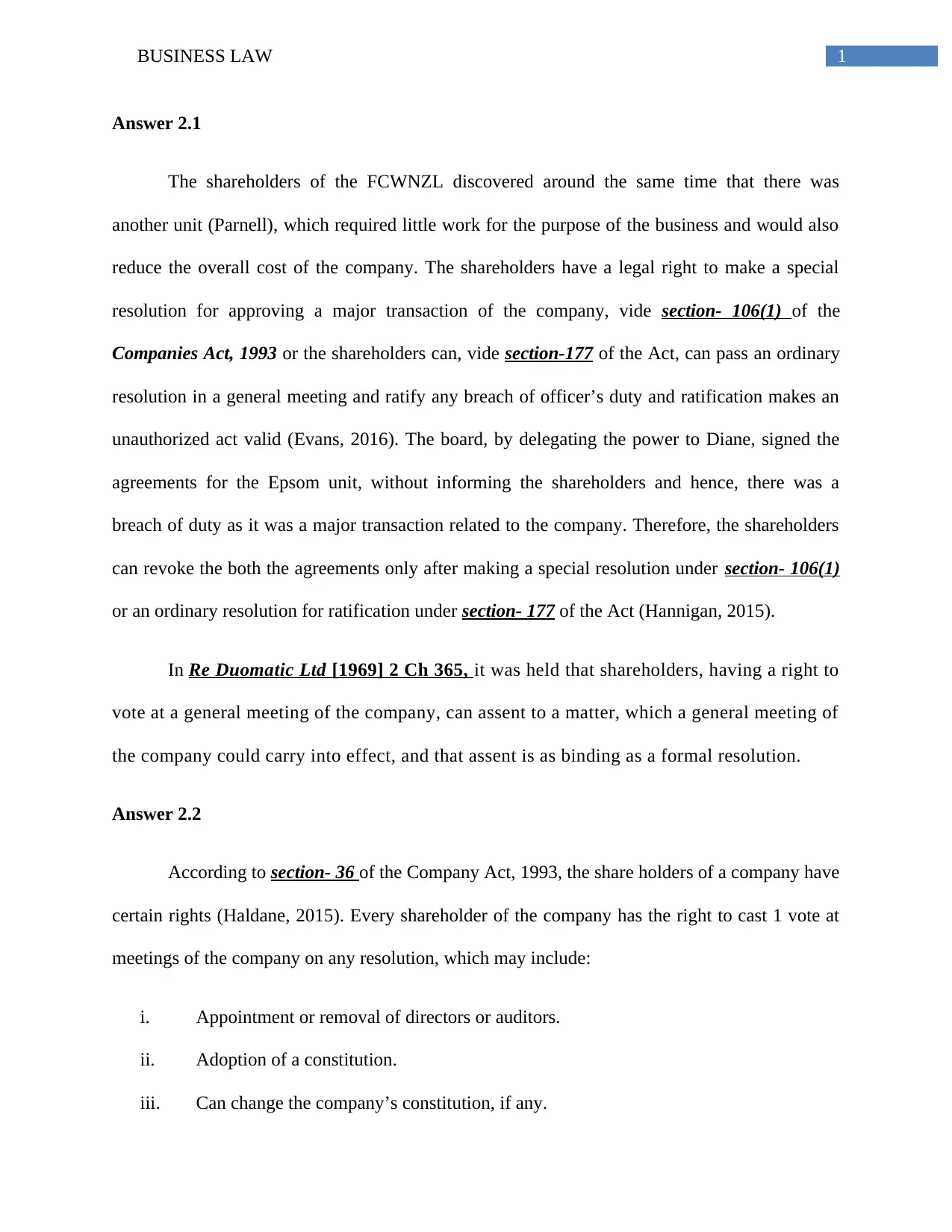
1BUSINESS LAW
Answer 2.1
The shareholders of the FCWNZL discovered around the same time that there was
another unit (Parnell), which required little work for the purpose of the business and would also
reduce the overall cost of the company. The shareholders have a legal right to make a special
resolution for approving a major transaction of the company, vide section- 106(1) of the
Companies Act, 1993 or the shareholders can, vide section-177 of the Act, can pass an ordinary
resolution in a general meeting and ratify any breach of officer’s duty and ratification makes an
unauthorized act valid (Evans, 2016). The board, by delegating the power to Diane, signed the
agreements for the Epsom unit, without informing the shareholders and hence, there was a
breach of duty as it was a major transaction related to the company. Therefore, the shareholders
can revoke the both the agreements only after making a special resolution under section- 106(1)
or an ordinary resolution for ratification under section- 177 of the Act (Hannigan, 2015).
In Re Duomatic Ltd [1969] 2 Ch 365, it was held that shareholders, having a right to
vote at a general meeting of the company, can assent to a matter, which a general meeting of
the company could carry into effect, and that assent is as binding as a formal resolution.
Answer 2.2
According to section- 36 of the Company Act, 1993, the share holders of a company have
certain rights (Haldane, 2015). Every shareholder of the company has the right to cast 1 vote at
meetings of the company on any resolution, which may include:
i. Appointment or removal of directors or auditors.
ii. Adoption of a constitution.
iii. Can change the company’s constitution, if any.
Answer 2.1
The shareholders of the FCWNZL discovered around the same time that there was
another unit (Parnell), which required little work for the purpose of the business and would also
reduce the overall cost of the company. The shareholders have a legal right to make a special
resolution for approving a major transaction of the company, vide section- 106(1) of the
Companies Act, 1993 or the shareholders can, vide section-177 of the Act, can pass an ordinary
resolution in a general meeting and ratify any breach of officer’s duty and ratification makes an
unauthorized act valid (Evans, 2016). The board, by delegating the power to Diane, signed the
agreements for the Epsom unit, without informing the shareholders and hence, there was a
breach of duty as it was a major transaction related to the company. Therefore, the shareholders
can revoke the both the agreements only after making a special resolution under section- 106(1)
or an ordinary resolution for ratification under section- 177 of the Act (Hannigan, 2015).
In Re Duomatic Ltd [1969] 2 Ch 365, it was held that shareholders, having a right to
vote at a general meeting of the company, can assent to a matter, which a general meeting of
the company could carry into effect, and that assent is as binding as a formal resolution.
Answer 2.2
According to section- 36 of the Company Act, 1993, the share holders of a company have
certain rights (Haldane, 2015). Every shareholder of the company has the right to cast 1 vote at
meetings of the company on any resolution, which may include:
i. Appointment or removal of directors or auditors.
ii. Adoption of a constitution.
iii. Can change the company’s constitution, if any.
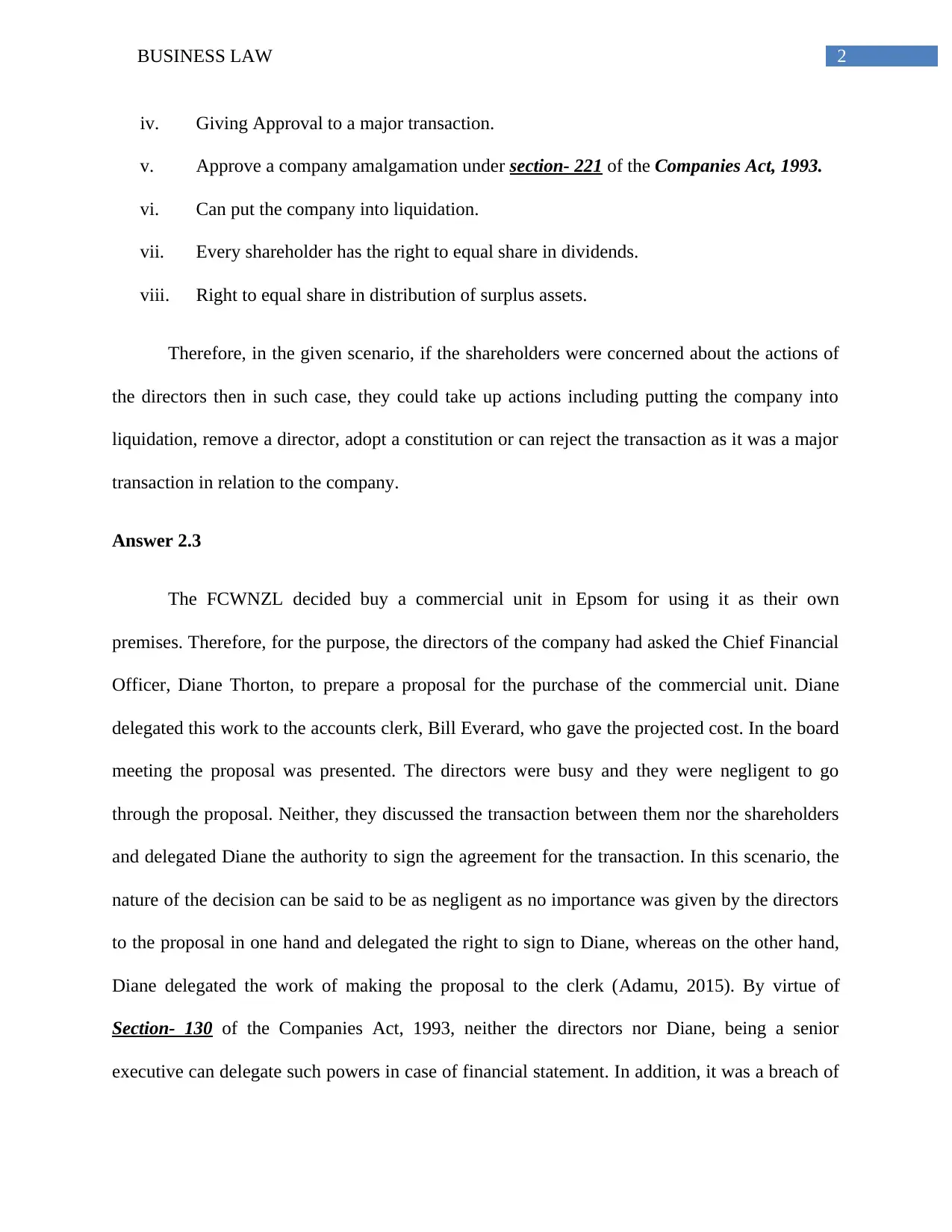
2BUSINESS LAW
iv. Giving Approval to a major transaction.
v. Approve a company amalgamation under section- 221 of the Companies Act, 1993.
vi. Can put the company into liquidation.
vii. Every shareholder has the right to equal share in dividends.
viii. Right to equal share in distribution of surplus assets.
Therefore, in the given scenario, if the shareholders were concerned about the actions of
the directors then in such case, they could take up actions including putting the company into
liquidation, remove a director, adopt a constitution or can reject the transaction as it was a major
transaction in relation to the company.
Answer 2.3
The FCWNZL decided buy a commercial unit in Epsom for using it as their own
premises. Therefore, for the purpose, the directors of the company had asked the Chief Financial
Officer, Diane Thorton, to prepare a proposal for the purchase of the commercial unit. Diane
delegated this work to the accounts clerk, Bill Everard, who gave the projected cost. In the board
meeting the proposal was presented. The directors were busy and they were negligent to go
through the proposal. Neither, they discussed the transaction between them nor the shareholders
and delegated Diane the authority to sign the agreement for the transaction. In this scenario, the
nature of the decision can be said to be as negligent as no importance was given by the directors
to the proposal in one hand and delegated the right to sign to Diane, whereas on the other hand,
Diane delegated the work of making the proposal to the clerk (Adamu, 2015). By virtue of
Section- 130 of the Companies Act, 1993, neither the directors nor Diane, being a senior
executive can delegate such powers in case of financial statement. In addition, it was a breach of
iv. Giving Approval to a major transaction.
v. Approve a company amalgamation under section- 221 of the Companies Act, 1993.
vi. Can put the company into liquidation.
vii. Every shareholder has the right to equal share in dividends.
viii. Right to equal share in distribution of surplus assets.
Therefore, in the given scenario, if the shareholders were concerned about the actions of
the directors then in such case, they could take up actions including putting the company into
liquidation, remove a director, adopt a constitution or can reject the transaction as it was a major
transaction in relation to the company.
Answer 2.3
The FCWNZL decided buy a commercial unit in Epsom for using it as their own
premises. Therefore, for the purpose, the directors of the company had asked the Chief Financial
Officer, Diane Thorton, to prepare a proposal for the purchase of the commercial unit. Diane
delegated this work to the accounts clerk, Bill Everard, who gave the projected cost. In the board
meeting the proposal was presented. The directors were busy and they were negligent to go
through the proposal. Neither, they discussed the transaction between them nor the shareholders
and delegated Diane the authority to sign the agreement for the transaction. In this scenario, the
nature of the decision can be said to be as negligent as no importance was given by the directors
to the proposal in one hand and delegated the right to sign to Diane, whereas on the other hand,
Diane delegated the work of making the proposal to the clerk (Adamu, 2015). By virtue of
Section- 130 of the Companies Act, 1993, neither the directors nor Diane, being a senior
executive can delegate such powers in case of financial statement. In addition, it was a breach of
⊘ This is a preview!⊘
Do you want full access?
Subscribe today to unlock all pages.

Trusted by 1+ million students worldwide
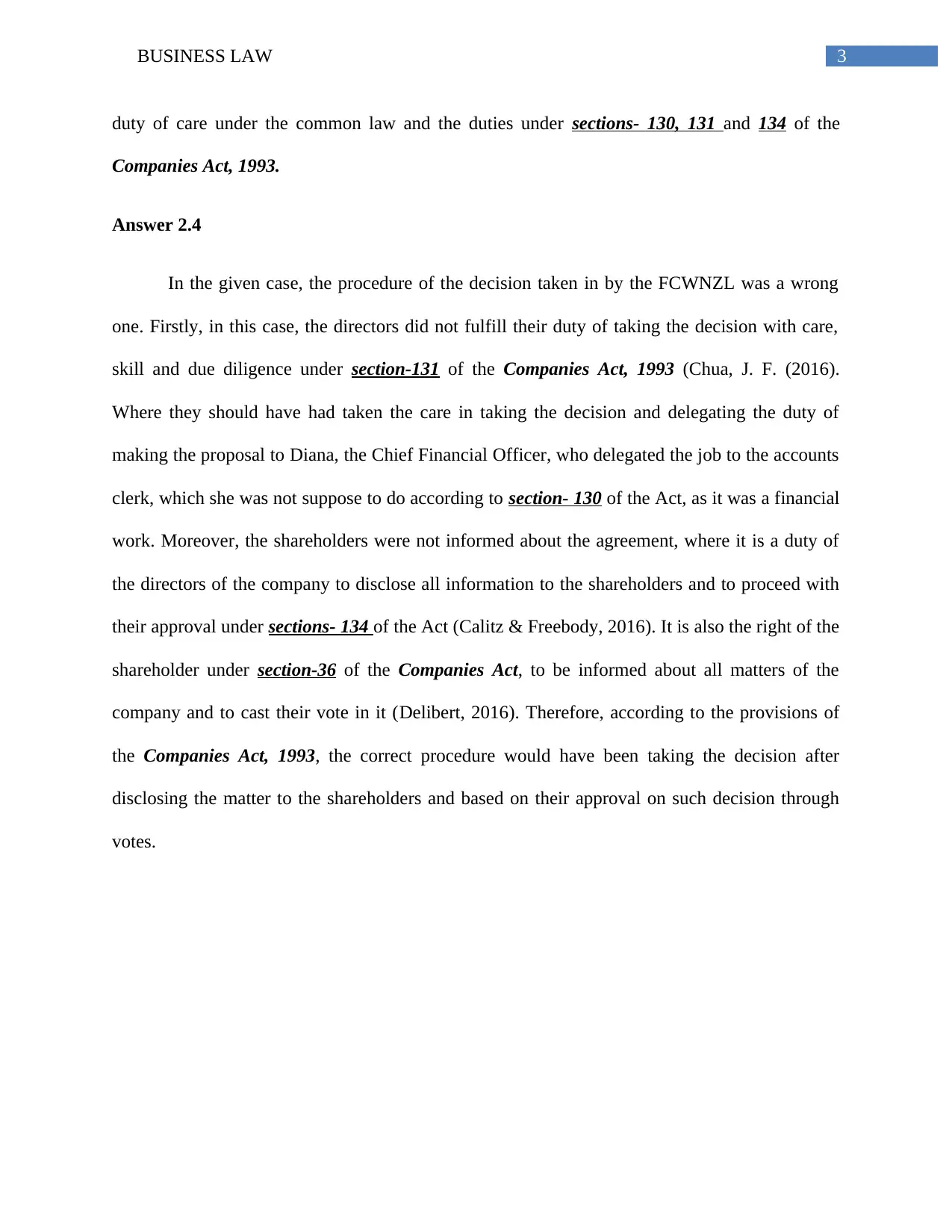
3BUSINESS LAW
duty of care under the common law and the duties under sections- 130, 131 and 134 of the
Companies Act, 1993.
Answer 2.4
In the given case, the procedure of the decision taken in by the FCWNZL was a wrong
one. Firstly, in this case, the directors did not fulfill their duty of taking the decision with care,
skill and due diligence under section-131 of the Companies Act, 1993 (Chua, J. F. (2016).
Where they should have had taken the care in taking the decision and delegating the duty of
making the proposal to Diana, the Chief Financial Officer, who delegated the job to the accounts
clerk, which she was not suppose to do according to section- 130 of the Act, as it was a financial
work. Moreover, the shareholders were not informed about the agreement, where it is a duty of
the directors of the company to disclose all information to the shareholders and to proceed with
their approval under sections- 134 of the Act (Calitz & Freebody, 2016). It is also the right of the
shareholder under section-36 of the Companies Act, to be informed about all matters of the
company and to cast their vote in it (Delibert, 2016). Therefore, according to the provisions of
the Companies Act, 1993, the correct procedure would have been taking the decision after
disclosing the matter to the shareholders and based on their approval on such decision through
votes.
duty of care under the common law and the duties under sections- 130, 131 and 134 of the
Companies Act, 1993.
Answer 2.4
In the given case, the procedure of the decision taken in by the FCWNZL was a wrong
one. Firstly, in this case, the directors did not fulfill their duty of taking the decision with care,
skill and due diligence under section-131 of the Companies Act, 1993 (Chua, J. F. (2016).
Where they should have had taken the care in taking the decision and delegating the duty of
making the proposal to Diana, the Chief Financial Officer, who delegated the job to the accounts
clerk, which she was not suppose to do according to section- 130 of the Act, as it was a financial
work. Moreover, the shareholders were not informed about the agreement, where it is a duty of
the directors of the company to disclose all information to the shareholders and to proceed with
their approval under sections- 134 of the Act (Calitz & Freebody, 2016). It is also the right of the
shareholder under section-36 of the Companies Act, to be informed about all matters of the
company and to cast their vote in it (Delibert, 2016). Therefore, according to the provisions of
the Companies Act, 1993, the correct procedure would have been taking the decision after
disclosing the matter to the shareholders and based on their approval on such decision through
votes.
Paraphrase This Document
Need a fresh take? Get an instant paraphrase of this document with our AI Paraphraser
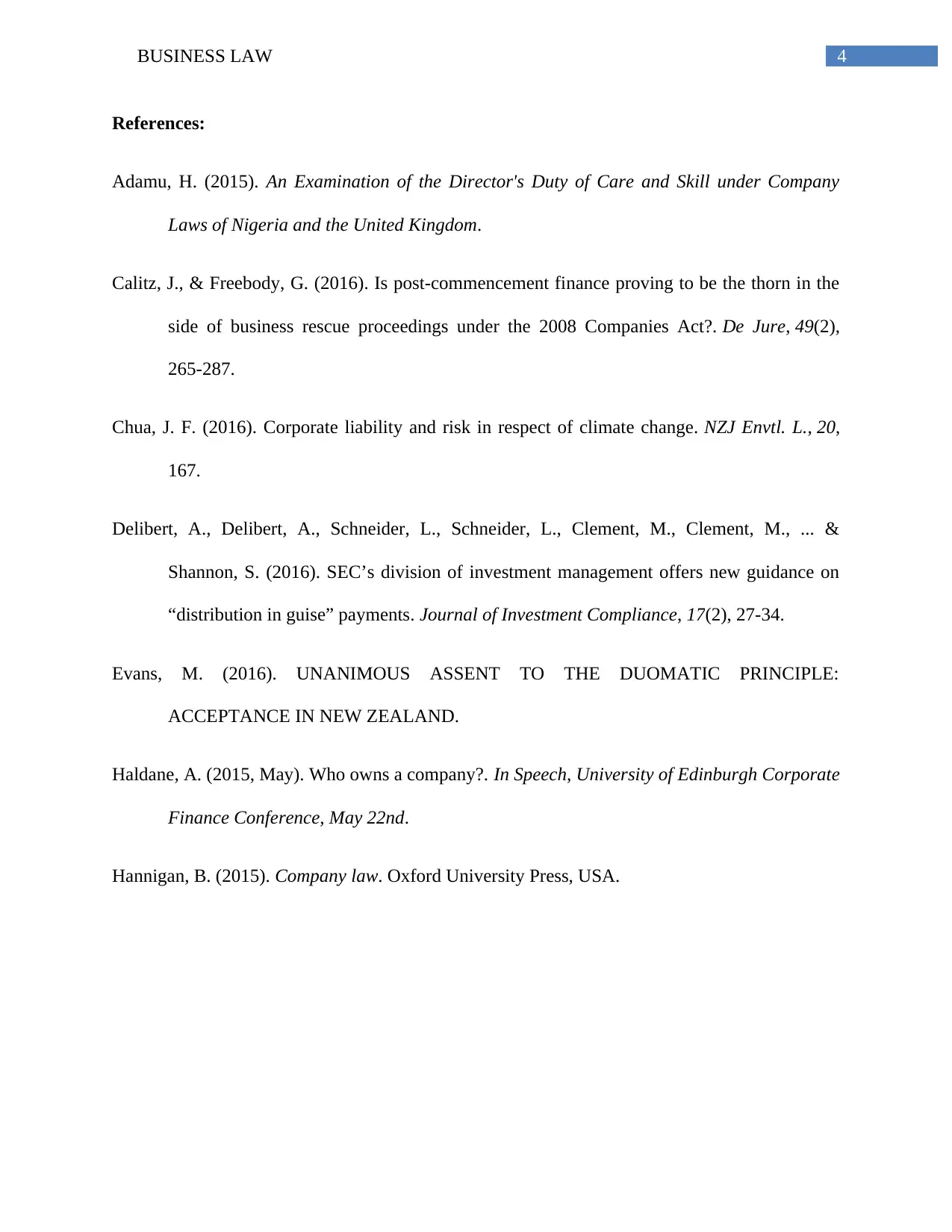
4BUSINESS LAW
References:
Adamu, H. (2015). An Examination of the Director's Duty of Care and Skill under Company
Laws of Nigeria and the United Kingdom.
Calitz, J., & Freebody, G. (2016). Is post-commencement finance proving to be the thorn in the
side of business rescue proceedings under the 2008 Companies Act?. De Jure, 49(2),
265-287.
Chua, J. F. (2016). Corporate liability and risk in respect of climate change. NZJ Envtl. L., 20,
167.
Delibert, A., Delibert, A., Schneider, L., Schneider, L., Clement, M., Clement, M., ... &
Shannon, S. (2016). SEC’s division of investment management offers new guidance on
“distribution in guise” payments. Journal of Investment Compliance, 17(2), 27-34.
Evans, M. (2016). UNANIMOUS ASSENT TO THE DUOMATIC PRINCIPLE:
ACCEPTANCE IN NEW ZEALAND.
Haldane, A. (2015, May). Who owns a company?. In Speech, University of Edinburgh Corporate
Finance Conference, May 22nd.
Hannigan, B. (2015). Company law. Oxford University Press, USA.
References:
Adamu, H. (2015). An Examination of the Director's Duty of Care and Skill under Company
Laws of Nigeria and the United Kingdom.
Calitz, J., & Freebody, G. (2016). Is post-commencement finance proving to be the thorn in the
side of business rescue proceedings under the 2008 Companies Act?. De Jure, 49(2),
265-287.
Chua, J. F. (2016). Corporate liability and risk in respect of climate change. NZJ Envtl. L., 20,
167.
Delibert, A., Delibert, A., Schneider, L., Schneider, L., Clement, M., Clement, M., ... &
Shannon, S. (2016). SEC’s division of investment management offers new guidance on
“distribution in guise” payments. Journal of Investment Compliance, 17(2), 27-34.
Evans, M. (2016). UNANIMOUS ASSENT TO THE DUOMATIC PRINCIPLE:
ACCEPTANCE IN NEW ZEALAND.
Haldane, A. (2015, May). Who owns a company?. In Speech, University of Edinburgh Corporate
Finance Conference, May 22nd.
Hannigan, B. (2015). Company law. Oxford University Press, USA.
1 out of 5
Your All-in-One AI-Powered Toolkit for Academic Success.
+13062052269
info@desklib.com
Available 24*7 on WhatsApp / Email
![[object Object]](/_next/static/media/star-bottom.7253800d.svg)
Unlock your academic potential
Copyright © 2020–2026 A2Z Services. All Rights Reserved. Developed and managed by ZUCOL.
